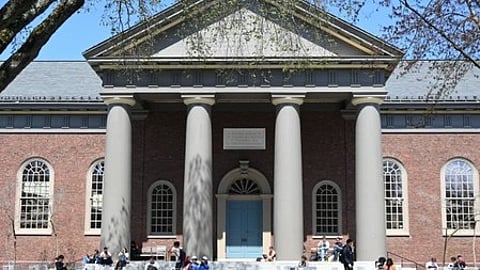

Responding to the Trump administration's moves to limit international students from entering the United States, Harvard University has implemented contingency plans to preserve academic continuity for its international student community.
Harvard's Kennedy School of Government and Harvard Business School are providing remote learning opportunities and global alternatives to campus access to the more than 7,000 affected international students, the Economic Times reports.
The Kennedy School has announced that students can take their courses online, with faculty-led sessions provided electronically. Furthermore, the school intends to hold up to three "in-person convenings in cities across the world," according to a newly developed student resource website.
These rigorous, credit-bearing sessions will be led by Kennedy School faculty. Students who are unable to go to the United States may continue their studies at the University of Toronto. More than half of Kennedy School students come from outside the United States.
“We hope to see you on campus in the fall, but if that is not possible, we will bring HKS to you,” a mail to the school affiliates from Jeremy M Weinstein, Dean of the Kennedy School, as reported by The Harvard Crimson.
At Harvard Business School, a similar strategy is in place. Dean Srikant Datar affirmed that the school would adopt the hybrid learning model that was implemented during the COVID-19 pandemic.
“Should foreign students not be allowed to enroll, we will need to draw on the creativity of our community, as we did during the pandemic, to reimagine an MBA programme that both embraces and overcomes a geographically dispersed class,” Datar said in an interview
He also noted the utilisation of Harvard's foreign research centres and alumni networks to facilitate in-person learning experiences in several nations. International students make up 35 per cent of the business school's master's degree and 40 per cent of its doctoral programmes.
These changes come after a controversy erupted on May 22, when the Department of Homeland Security suspended Harvard's ability to host foreign students through the Student and Exchange Visitor Program (SEVP).
Homeland Security Secretary Kristi Noem stated that the move was triggered by Harvard's "failure to comply" with information requests relating to international student misconduct, which the university denies.
After Harvard filed a lawsuit opposing the federal action, the Trump administration issued a White House proclamation prohibiting international students, invoking a Cold War-era statute that had never been utilised against a domestic university.
Last Monday, Judge Allison D Burroughs of the US District Court in Boston issued a preliminary injunction halting execution of the administration's directions while legal procedures are ongoing.
